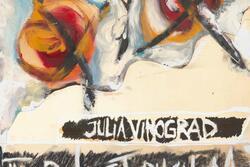Dorothy Fields put the "broad" in Broadway
Last Friday marked the 106th anniversary of the birth of Dorothy Fields, the first woman to be inducted into the Songwriters Hall of Fame and the only woman who holds an uncontested spot in the boys' club that is credited with creating the Great American Songbook. Fields was a member of a prolific showbiz family, with a father and two brothers in the business. You can learn more about her life in the Jewish Women: A Comprehensive Historical Encyclopedia, or hear her tell the story herself on the album An Evening With Dorothy Fields (a recording of a 1972 event at the 92nd Street Y in New York).
Fields was a remarkable woman in many ways, still influencing our culture nearly forty years after her death: President Obama alluded to her lyrics in his inaugural address; teenagers danced to one of her songs in Step Up 3D; and when Stephen Sondheim released a book of his lyrics including his musings about his predecessors, Fields stood out as just about the only lyricist who comes out looking great.
As both a lyricist and a librettist, Fields had the opportunity to create a variety of characters who pushed boundaries of femininity on stage. Fields loved to play with the archetype of the "broad," the woman with a quick wit and big personality. From sharp-shooter Annie Oakley to taxi-dancer Charity Hope Valentine, Fields' heroines balanced power and vulnerability. At times they drew strength from their transgressive gender presentation and sexuality; at times those very same characteristics exposed them to criticism and vulnerability.
The broads created by Dorothy Fields were not shy about speaking their piece. In one of Fields’ early book musicals, Stars in Your Eyes, Ethel Merman introduced the song "A Lady Needs a Change," a paean to sexual variety. The song asserts that a woman is not only right in seeking out sexual pleasure, but that it's her partner's obligation to keep things spicy in order to keep her around.
And yet Fields' women were aware of the double-edged sword of their "broad-ness." Gittel, the heroine of Fields' final musical, Seesaw, laments "I've got a big, loud mouth / I'm always talking much to free / if you go for tact and manners / better stay away from me." But it are the very flaws Gittle catalogs that endear her to the audience.
Fields hinted at a dark side to this acceptance. Annie Oakley can't land her man until she "civilizes" herself, ultimately choosing to throw away her career so that her lover won't feel threatened. Charity loses the one nice guy she's ever dated because he can't handle her past as a rent girl. And yet, Annie Get Your Gun ends with a winking acknowledgment that Annie will always hold the cards in her relationship, and even Charity lives "hopefully ever after."
This may come across as a bit of apologizing for an artist who simply wasn't as much of a feminist as I want her to have been. After all, for every strong woman number like "Holiday Inn," she also wrote codependent anthems like "Make the Man Love Me." Annie, Charity, Gittle, and others all end their shows either in the arms of a man or with a declaration that they will find themselves a man or else.
And yet, Fields herself was a broad. Just listen to her talk about her life:
And Fields never found herself that man. Her first marriage was unhappy and ended in divorce. Biographer Charlotte Greenspan questions whether Fields’ second marriage, to Eli Lahm, was happy either, noting that there is only one surviving photograph of the couple together. Dorothy Fields is remembered as an artist and a trailblazer, not as somebody's wife or mother. Greenspan posits that whether or not Fields was happy in the role of wife, by the time she married Lahm, she was a formidable woman in her own right unlikely to be hampered by a husband. One wonders whether the sometimes pitiable lengths to which her heroines went in order to secure themselves a mate were wish fulfillment on the part of Fields -- or lampooning.
It's hard to imagine that Fields, who worked until the day she died (during the rehearsal period for Seesaw), envied Oakley's sacrificing her career for romance. And the fairy godmother that inspires Charity to live hopefully ever after is revealed to be an actress on a publicity stunt for a television show.
So looking back on her life and work, we're left to debate whether her characters were liberated broads or merely not as oppressed as some of their contemporaries; whether Fields was acquiescing to societal standards or mocking them. And it seems to me that regardless of where each of us lands with respect to these questions, the fact that her work continues to inspire such discussion so many decades later is itself an achievement worth celebrating.






Great article David! I always thought if all this genius had penned was "A Fine Romance" with Jerome Kern she would deserve to be called the greatest female lyricist of her time. But, my. .. what followed. Thanks. Jimmy H
Hi Joe - Thanks for the compliments! You can hear the Merman song by clicking on the little arrow below that paragraph. (It's a little hard to see, but it's here.)
David - I'll Buy You a Star for this wonderful distillation of Fields career and personal life. You really filtered her work through your own informed perspective for a just right summary, and it's written so aptly - it's a pleasure to read the flow of your prose.
I never heard the Merman song but would like to. Thanks for some great reading. (how did the President allude to DF's work.?)